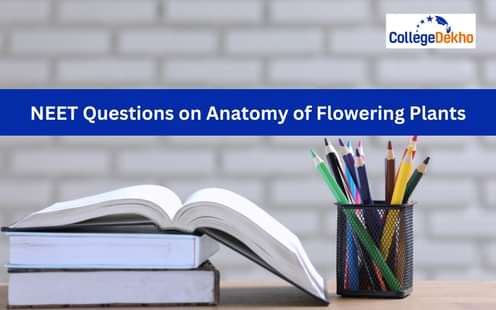
NEET Questions on Anatomy of Flowering Plants discusses some important and repetitive questions that are important for the upcoming NEET 2025 Exam . The NEET Questions on Anatomy of Flowering Plants with Solutions will aid aspiring students in forming an idea about the type of questions asked from this chapter. Candidates should know that the NEET Syllabus 2025 contains chapters from both Class XI and XII of the CBSE curriculum. Anatomy of Flowering Plants is the 6th chapter taken from the Class XI curriculum. The total weightage of the NEET Questions on Anatomy of Flowering Plants is 7% of Biology Syllabus. Candidates can expect that a total of 6 to 8 MCQ questions to be asked from Anatomy of Flowering Plants. Students must make sure to regularly solve the previous year question papers and attempt mock tests to pass the NEET Exam 2025 without any hurdles.
Important NEET Questions on Anatomy of Flowering Plants is one of the most elaborate chapters for the NEET Exam. The chapter is mainly based on the mechanisms of a flowering plant. The important topics for the NEET MCQ on Anatomy of Flowering Plants include tissues and cells of plants, functions of leaves, and structure and function of stems, seeds, fruits, and flowers. One of the best ways to prepare for the NEET Questions on Anatomy of Flowering Plants is to refer to the best books, learning materials, and previous year question papers. Read the article below to learn in detail about the NEET Questions on Anatomy of Flowering Plants, important questions, and how to prepare.
NEET MCQs on Anatomy of Flowering Plants
Candidates can refer to the questions below to generate an idea about the types of NEET Questions on Anatomy of Flowering Plants with Solutions
Q.1 Which tissue is considered as most primitive both ontogenetically as well as phylogenetically?
- Parenchyma
- Collenchyma
- Sclerenchyma
- Aerenchyma
Answer: A
Q.2 Meristems are not found in:
- Cycas stem
- Pollen of Pinus
- Fern leaf
- Fern rhizome
Answer: C
Q.3 Passage cells are thin-walled cells found in
- testa of seeds to enable the emergence of a growing embryonic axis during seed germination
- the central region of style through which the pollen tube towards the ovary
- phloem elements that serve as entry points for substances for transport to other plant parts
- endodermis of roots facilitating rapid transport of water from cortex to pericycle
Answer: D
Q.4 Choose the correct option for 1 and 2.
- Tracheid, 2 - Vessel
- 1 - Vessel, 2 - Tracheid
- 1 - Fibre, 2 - Tracheid
- 1 - Fibre, 2 - Sclereid
Answer: A
Q.5 Healing of wounds in plants takes place by the activity of:
- Intercalary meristem
- Secondary meristem
- Apical meristem
- Lateral meristem
Answer: B
Q.6 Heartwood differs from sapwood in
- being susceptible to pathogens and pests
- having dead and non-conducting elements
- presence of fibers and rays
- absence of vessels and parenchyma
Answer: B
Q.7 Monocot leaves grow by:
- Apical meristem
- Lateral meristem
- Intercalary meristem
- Dermatogen
Answer: C
Q.8 Anatomically fairly old dicotyledonous root is distinguished from the dicotyledonous stem by
- absence of secondary xylem
- position of protoxylem
- presence of cortex
- absence of secondary phloem
Answer: B
Q.9 This is an incorrect statement in the context of Heartwood
- organic compounds are deposited in it
- it comprises dead elements with highly lignified walls
- it conducts water and minerals efficiently
- it is highly durable
Answer: C
Q.10 Which one of the following statements is correct about bull form/motor cell?
- It is seen in grasses
- It is large-sized, thin-walled colourless, vacuolated cells on the adaxial surface
- It helps in rolling of leaf to minimise water loss when it is flaccid
- it is highly durable
Answer: C
Q.11 The heartwood of Acacia catechu is rich in
- Gums
- Resins
- Tannins
- Mucilages
Answer: C
Q.12 Bamboo and grasses elongate by the activity of
- Apical meristem
- Lateral meristem
- Secondary meristem
- Intercalary meristem
Answer: D
Q.13 The balloon-shaped structures called tyloses
- are linked to the ascent of sap through xylem vessels
- are extensions of xylem parenchyma cells into vessels
- characterize the sapwood
- originate in the lumen of vessels
Answer: B
Q.14 Some vascular bundles are described as open because these
- are not surrounded by pericycle
- possess conjunctive tissue between the xylem and phloem
- are surrounded by pericycle but no endodermis
- are capable of producing secondary xylem and phloem
Answer: D
Q.15 If a stem is girdled
- root dies first
- shoot dies first
- Both die together
- Neither root nor shoot would die
Answer: A
NEET Questions with Solutions on Anatomy of Flowering Plants is very important for the candidates to prepare as the total weighatge of the chapter is 7%. It would be foolish for aspirants to skip the chapter since almost 6 to 8 MCQs will be asked from this section. One of the preparation tips shared by toppers of the exam is to clear doubts of the candidates while they still have time for preparation. ‘Learning materials like diagrams, charts, models, previous year question papers, and planners can help candidates prepare the NEET MCQ Questions on the Anatomy of Flowering Plants. Regularly attending the mock test will also aid candidates in answering all the NEET MCQs on Anatomy of Flowering Plants without making any mistakes. For more articles related to Nursing, Paramedical, and Medical, follow CollegeDekho.
Related Articles:
Are you feeling lost and unsure about what career path to take after completing 12th standard?
Say goodbye to confusion and hello to a bright future!

Was this article helpful?




















Similar Articles
Expected NEET SS 2025 Cutoff Scores for ENT
Expected NEET SS 2025 Cutoff Scores for Microbiology
Expected NEET SS 2025 Cutoff Scores for Medical Oncology
Top 5 Super-Specialties with Lowest NEET SS 2025 Cutoffs
Expected NEET SS 2025 Cutoff Scores for Orthopaedics
Expected NEET SS 2025 Cutoff Scores for Anaesthesiology